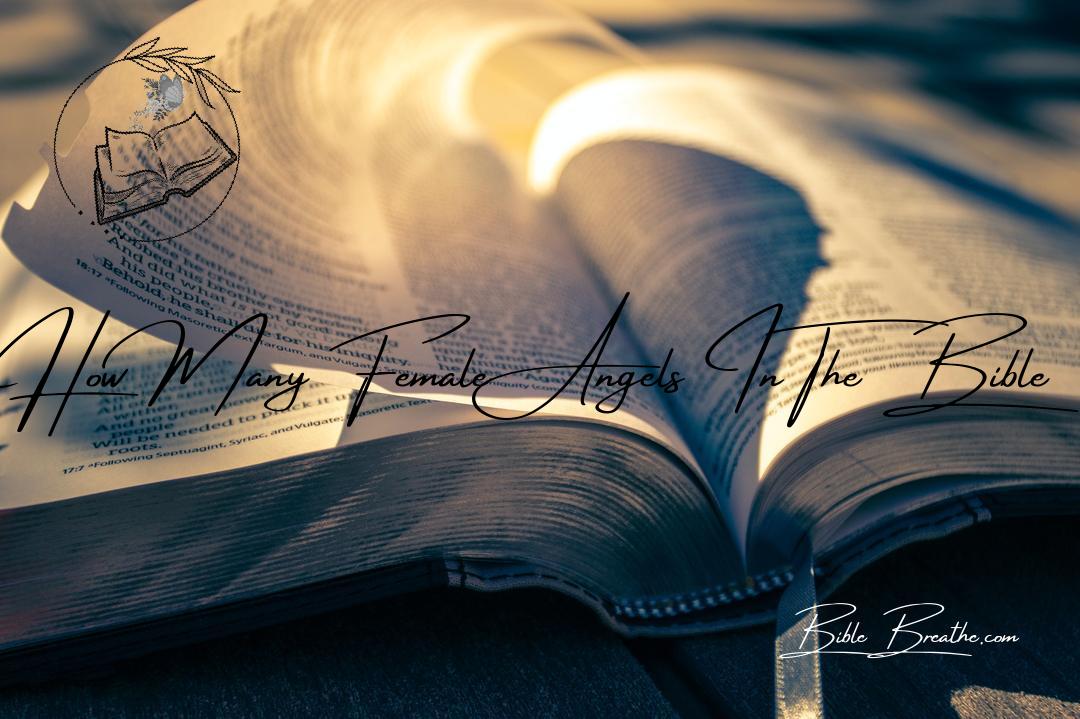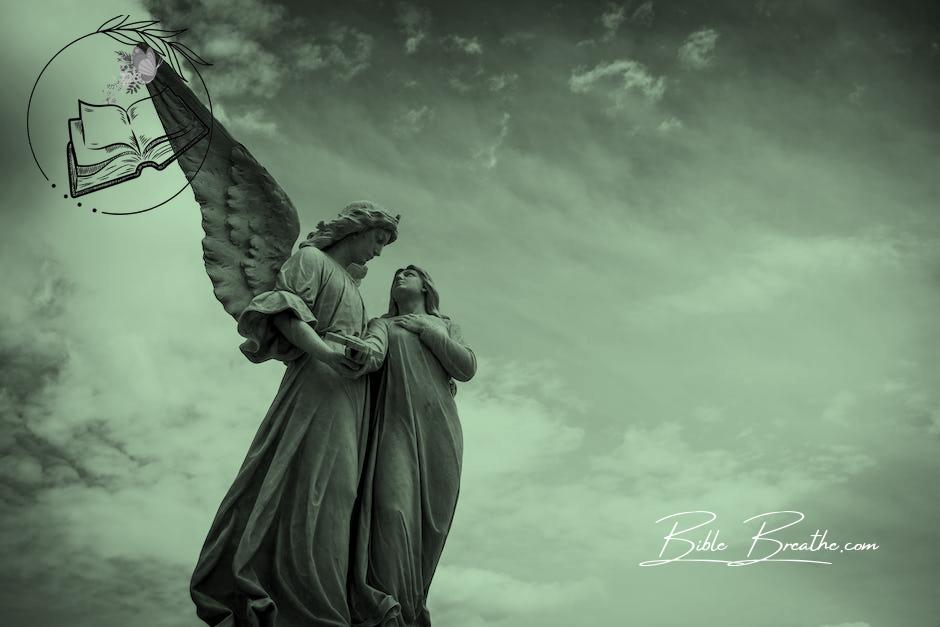How many female angels in the Bible?
This question might sound like a divine conundrum, but let’s break it down real simple.
We’re talking about those celestial messengers, you know, the ones with wings and all.
The Bible’s like a treasure trove, filled with stories of angels, including the big shots like Michael and Gabriel.
But here’s the twist – when it comes to their gender, the Bible keeps us guessing.
So, we’re going on a heavenly journey, exploring the whole idea of angelic gender.
Are there female angels, and if there are, what’s their role?
The Bible gives us cherubim and seraphim, but it’s like reading a riddle.
Why should we even care about the gender of angels, you ask?
Well, that’s what we’re gonna uncover.
It’s like understanding the mysteries of the divine in a way that’s relatable to our lives.
Let’s dive in, and I promise it’ll be an eye-opener.🌟
Key Takeaways
- How many female angels in the Bible? The Bible does not explicitly mention the number or names of female angels. It predominantly refers to angels in a gender-neutral or masculine manner, such as “sons of God” or using male pronouns. This lack of explicit mention has led to interpretations that angels may not possess gender as humans do.
- Understanding angelic beings in religious contexts is crucial for appreciating the spiritual realm and its impact on beliefs and practices. Angels are often viewed as messengers, agents of God’s will, and guardians in various religious traditions. Acknowledging their presence and role can deepen one’s understanding of the divine and the interconnectedness of the spiritual and physical worlds.
- The absence of explicit female angelic figures in the Bible can prompt exploration of broader discussions concerning gender representation and roles within religious texts and traditions. It encourages critical thinking about how religious narratives shape perceptions of gender and influence societal attitudes and norms. This understanding fosters a more inclusive and nuanced interpretation of religious teachings.
Exploring the Angelic Realm in the Bible
Photo modified by BibleBreathe.com. Original photo by Rachel Xiao on Pexels
As we delve into the question of how many female angels are mentioned in the Bible, we step into the celestial realms.
In this exploration, we’ll not only tally the numbers of angels but also uncover the intriguing hierarchy of these divine messengers.
The Angelic Hierarchy
To understand angels in the Bible, envision a celestial corporate ladder.
At the top, you have the Archangels—the bigwigs like Michael and Gabriel.
They’re akin to the executive vice presidents of the heavenly realm.
Their duties involve conveying crucial messages from the Almighty, often taking the spotlight in biblical tales.
Moving down this celestial hierarchy, we encounter the Cherubim and Seraphim.
These angelic beings are like the middle managers, entrusted with specific tasks and guarding sacred spaces.
Picture them as diligent supervisors in the divine office, ensuring all runs smoothly in the ethereal world.
Now, let’s tackle the heart of the matter—angels aren’t assigned a gender label in the Bible.
They’re often portrayed as androgynous or without a defined gender.
They transcend earthly classifications.
So, when you ask about female angels, it’s vital to understand that the biblical text doesn’t explicitly attribute gender to these celestial messengers.
Roles and Responsibilities of Each Hierarchy
Angels, regardless of gender or lack thereof, possess distinct roles.
They act as messengers, protectors, and guides.
Think of them as the divine customer support team, always ready to assist—whether it’s delivering vital news, guarding someone in times of trouble, or providing guidance in moments of need.
In modern terms, consider your smartphone’s voice assistant—always there to help, never missing a beat.
Angels, in their celestial way, play a similar role in the grand scheme of things.
So, while we can’t tally female angels in the Bible, we can appreciate the diversity and complexity of these celestial beings.
They’re not bound by earthly conventions, and their purpose transcends our human understanding.
As the Bible reminds us, > “”For he shall give his angels charge over thee, to keep thee in all thy ways.”” – Psalm 91:11 (KJV).
Regardless of gender or lack thereof, angels continue to watch over and guide us on our earthly journey.
Angels Beyond the Binary: A Peek into the Heavenly Host
Photo modified by BibleBreathe.com. Original photo by Pixabay on Pexels
When we talk about angels, our minds often drift to names like Michael and Gabriel—mighty celestial warriors, right?
They’ve got some serious celestial clout.
“”In the heavenly boxing ring, it was a showdown: Michael and his crew duking it out with the dragon and his posse.”” – Revelation 12:7 (KJV)
“”Hey, I’m Gabriel, on direct line with God, and I’m here to deliver the 411.”” – Luke 1:19 (KJV)
These verses put a spotlight on these heavenly heavyweights, God’s messengers and defenders.
But here’s where the celestial plot thickens.
While the Bible has its fair share of angelic encounters, it doesn’t drop any names of female angels.
Now that’s a head-scratcher!
You ever wondered if there are heavenly sisters in the choir, singing hosannas and dropping divine wisdom bombs?
It’s a missing puzzle piece that has got theologians and scholars doing some divine detective work, pondering on the celestial organizational chart and the roles of angels in God’s big picture.
Some say angels rise above the gender game as we know it, being more like ethereal spirits in the great beyond.
In the world of biblical pondering, the absence of named female angels makes us think hard about the divine setup and the secrets of the heavenly hangout.
As we venture into the world of heavenly hosts, we’ve got Michael and Gabriel, the star players.
But the mystery of whether there are celestial sisters remains an enigma, inviting us to think deeper about the divine mysteries.
In this biblical adventure, angels step up as God’s delivery squad, protectors, and divine GPS.
Even though the script doesn’t bring female angels on stage, you can bet the heavenly choir sings in perfect harmony, each angel playing a vital role in God’s cosmic masterpiece.
Female Angels in the Bible: Unveiling a Mystery
Photo modified by BibleBreathe.com. Original photo by Pixabay on Pexels
As we contemplate the intriguing question of how many female angels exist in the Bible, we step into the captivating and often debated world of angelic lore.
Let’s unravel the hints, interpretations, and debates surrounding the presence of female angels in the celestial realm.
Hints in Biblical Passages
While the Bible doesn’t explicitly introduce us to “female” angels, there are intriguing passages hinting at angelic beings with feminine characteristics.
These hints are like pieces of a celestial puzzle waiting to be assembled.
1. The Angel of the Lord
In certain biblical accounts, an “Angel of the Lord” appears, representing God’s divine presence.
Although not explicitly labeled as female, this figure emanates qualities that some interpret as feminine, such as compassion and nurturing care.
It’s as if this angel embodies the maternal love of the Divine.
2. Wisdom Personified
In the Book of Proverbs, we encounter Lady Wisdom, described in a way that mirrors angelic qualities.
She is portrayed as God’s companion during creation, suggesting a close and harmonious relationship.
Although not identified as an angel, Lady Wisdom possesses angelic traits of wisdom, guidance, and divine connection.
Interpretations and Scholarly Debates
The question of whether there are female angels in the Bible sparks lively debates among scholars and theologians.
Some argue that angels are genderless or beyond our human understanding of gender, emphasizing their spiritual essence over physical characteristics.
Others assert that the Bible intentionally conceals the gender of angels to highlight their transcendent nature.
In these discussions, various interpretations emerge.
Some believe that angels can assume different forms, including feminine ones, when interacting with humans.
This allows them to convey specific messages or attributes in a relatable way.
Others maintain that the absence of explicit female angels in the Bible is significant, emphasizing the focus on their spiritual mission rather than their gender.
In the end, the existence of female angels in the Bible remains a topic of interpretation and faith.
Whether you envision angels as winged messengers, ethereal beings, or genderless entities, their presence in biblical narratives continues to inspire wonder and contemplation.
As we ponder this celestial mystery, let us remember the words of the Bible:
“For he shall give his angels charge over thee, to keep thee in all thy ways.” – Psalm 91:11 (KJV).
Whether male, female, or beyond our earthly understanding, angels serve as guardians and guides on our spiritual journey.
Angels and Gender: Unveiling the Divine Enigma
Photo modified by BibleBreathe.com. Original photo by Lisa Fotios on Pexels
So, you’re wondering, how many female angels are hanging out in the pages of the Bible?
Well, grab your celestial magnifying glass, ’cause we’re diving into the mystique of angelic beings and their cosmic connection to gender.
Whoa there, hold your celestial horses! Let’s talk about angels and what makes ’em tick in the gender department.
Angels, as the good book lays it out, really throw a curveball at our usual understanding of gender.
Picture this: they’re like that enigmatic puzzle piece that doesn’t fit into the earthly gender puzzle.
They’re often depicted as this blend of both, or sometimes, neither.
Now, that’s a twist!
Angels are like the cosmic VIPs, free from the chains of our earthly labels. They’re the pure, ethereal essence of the divine, beyond our regular human experiences.
Now, let’s peek into the divine debate club where theologians and scholars have been sparring over angelic gender for eons.
One big notion is that angels are, by nature, genderless.
Yeah, you heard it right.
In their realm, male and female are like yesterday’s news—no longer making headlines.
They’re all about that spiritual calling, fulfilling their divine purpose.
Angels, they’re the real deal messengers from God, and they play it versatile. Whether they lean masculine, feminine, or gender-neutral, their gig stays the same—guiding, guarding, and delivering God’s hot-off-the-heaven press releases to us down here.
Now, when we ponder angelic gender, keep this in mind: “God’s got their back, always. He’s got these angels on duty, looking out for you, 24/7.”
No matter how you slice it, angels are heaven-sent agents taking care of us.
Sure, the Bible doesn’t drop names of female angels, but it delivers a deeper spiritual truth—the genderless and mind-boggling nature of these heavenly messengers.
They remind us of the divine riddle that’s all around us, guiding us in this earthly rollercoaster with an abundance of love and grace.
So, keep on flying, angel!
The Role and Significance of Angels in Biblical Narratives
Photo modified by BibleBreathe.com. Original photo by Pixabay on Pexels
As we journey into the realm of biblical angels, we often encounter celestial beings like Michael and Gabriel, prominently depicted as masculine messengers.
However, the presence and roles of female angels within the divine narrative remain a subject of curiosity and theological contemplation.
Understanding Their Roles and Responsibilities
Although the Bible doesn’t explicitly introduce us to named female angels in its canonical scriptures, it’s vital to recognize that angels, regardless of gender, hold pivotal roles in the biblical narrative.
They act as messengers, protectors, and instruments of God’s will.
“”Are they not all ministering spirits, sent forth to minister for them who shall be heirs of salvation?”” – Hebrews 1:14 (KJV)
This verse underscores the general role of angels as ministering spirits, highlighting their importance in guiding and safeguarding believers.
Even though female angels may not be explicitly named, they are believed to partake in these divine responsibilities.
Grasping Their Importance in Biblical Narratives
While named female angels may not be explicitly mentioned in the Bible, it’s crucial to acknowledge a broader spiritual understanding that transcends earthly gender distinctions.
In biblical narratives, angels emerge during critical moments of revelation, guidance, and protection.
For example, when the angel appeared to the women at the empty tomb of Jesus, it marked a profound moment in Christian history.
“And the angel answered and said unto the women, Fear not ye: for I know that ye seek Jesus, which was crucified. He is not here: for he is risen, as he said. Come, see the place where the Lord lay.”” – Matthew 28:5-6 (KJV)
In this instance, the gender of the angel was not specified, underscoring the universal message of hope and resurrection.
In conclusion, while the Bible does not expressly name female angels, their significance is interwoven into the fabric of biblical narratives.
Angels, encompassing both male and female essences, serve as messengers and guardians in the grand design of God’s plan.
Their roles transcend earthly gender distinctions, reminding us of the spiritual depth and mystery enveloping the celestial realm.
Frequently Asked Questions (FAQs) About How Many Female Angels In The Bible
Are there any female angels mentioned by name in the Bible?
The Bible does not specifically mention female angels by name.
Angels in Scripture are typically depicted as male or androgynous beings.
Why are most angels depicted as male in religious art?
Most angels are depicted as male in religious art due to historical and cultural influences.
In the Bible, angels are often described with masculine attributes, and this interpretation has carried over into artistic representations.
However, angels are considered genderless beings in their divine nature.
How do different religious traditions view the gender of angels?
Various religious traditions have diverse views on angelic gender.
Some believe angels to be genderless or androgynous beings without human characteristics, while others assign specific genders based on cultural and religious interpretations.
Overall, angelic gender differs widely across religious beliefs and teachings.






